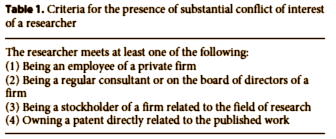 I belatedly became aware of the magnitude of the Conflict of Interest [COI] problems in our literature in 2008 with the revelations of Senator Chuck Grassley and his investigator Paul Thacker. But in the years since, I’ve realized that by then what was once unthinkable had already verged on routine, particularly in the industry-sponsored clinical drug trials, particularly in psychiatry. Recently, we’ve seen several articles advocating an even further laxing of COI standards. In this editorial, Dr. Fava goes beyond just decrying the COI problem – he lays out how it came into being and the forces that sustain it. Then he talks about what we can do about the problem…
I belatedly became aware of the magnitude of the Conflict of Interest [COI] problems in our literature in 2008 with the revelations of Senator Chuck Grassley and his investigator Paul Thacker. But in the years since, I’ve realized that by then what was once unthinkable had already verged on routine, particularly in the industry-sponsored clinical drug trials, particularly in psychiatry. Recently, we’ve seen several articles advocating an even further laxing of COI standards. In this editorial, Dr. Fava goes beyond just decrying the COI problem – he lays out how it came into being and the forces that sustain it. Then he talks about what we can do about the problem… by Giovanni FavaPsychotherapy and Psychosomatics. 2016 85:65-70.A series of three articles by Lisa Rosenbaum in the New England Journal of Medicine called for a reexamination of the views and regulations of financial conflicts of interest in medicine. Her conclusions appeared to be clear: ‘The bad behavior of the few has facilitated impugning of the many.’ The effects of this behavior were amplified by journalists who fed a vicious cycle in which each story generates more distrust in the public. Dr. Rosenbaum suggested that current restrictive rules may ‘undermine potentially productive research collaborations, dissemination of expertise, and public trust.’ She acknowledged that studies by pharmaceutical companies are more likely to have outcomes favorable to the sponsor and that physicians who attend events funded by pharmaceutical companies tend to prescribe the featured drugs. However, she claimed that these interactions might actually be beneficial to the patient and that much of the harm was ‘invented’. Dr. Rosenbaum’s views were in sharp contrast with the history of the journal where they were published. The New England Journal of Medicine pioneered the need of disclosure of financial conflicts of interests and the importance of having authors of editorials and review articles free from commercial ties, yet time seems to be ripe for getting rid of these worries and to return to business as usual.
A recent viewpoint published in the JAMA moves toward this direction. Also, these authors complain of the policies on conflicts of interest that were developed in reaction to a limited number of investigators but, once introduced, applied to all. They suggested substituting the pejorative term of ‘conflict of interest’ with ‘confluence of interest’. A name change can be important. When withdrawal reactions started being described following the discontinuation of second-generation antidepressant drugs [selective serotonin reuptake inhibitors, SSRI] they were promptly labeled as ‘discontinuation syndromes.’ The name successfully conferred a harmless nature, which was in sharp contrast with the withdrawal reactions that occurred with other drugs like benzodiazepines. SSRI thus replaced benzodiazepines in the treatment of anxiety disorders, even though discontinuation syndromes of SSRI are actually withdrawal reactions, and the clinical evidence was pointing to just the opposite [benzodiazepines are more effective, with fewer side effects]. The shift from benzodiazepines to SSRI has probably been the most successful achievement of pharmaceutical propaganda in psychiatry, with full endorsement of guidelines and professional societies. Will the term ‘confluence of interest’ achieve the same success? Let us examine the development of the problem, its implications and what can be done about it…
[1] Definition of Financial Conflict of Interest
"Researchers with substantial conflicts of interest are not suitable for writing and participating in reviews, editorials, meta-analyses and guidelines …"
"… the industry may interact with academic investigators through consulting agreements that benefit the university but not the investigator, eliminating any source of direct financial benefit for the individual from the company."
[2] The Pursuit of Critical Thinking in Clinical Practice and Research"Preserving intellectual freedom in the setting of proliferating connections between pharmaceutical and biotechnology industries and the physicians is a major ethical challenge of medicine today. Loosening rules that were developed over an incredible sequence of scandals and jeopardized the credibility of medicine would not offer a suitable solution…"
"As Wilkes commented on the consequences of inappropriate industry-physician interactions: ‘When trust goes, so does the healing power of physicians.’ Similarly, medical journals do not lose their function to the extent that they foster critical thinking as to clinical matters and do not lose their credibility. Such critical thinking may also be increased by the opportunity at scientific meetings for in-depth discussions among clinical scientists with no substantial conflicts of interest – a pause from information overload."
[3] The Inadequacy of EBM"Recently, Richardson and Doster suggested the consideration of three dimensions in the process of evidence-based decision: baseline risk of poor outcomes from an index disorder without treatment, responsiveness to the treatment option, and vulnerability to the adverse effects of treatment. EBM is focused on the potential benefits that therapy may entail as to baseline risk, but it is likely to neglect the other two dimensions. A rational approach to treatment takes into account the balance between potential benefits and adverse effects applied to the individual patient."
"EBM certainly made an important contribution to questioning unsubstantiated therapeutic claims. Time has come, however, to become more aware of its considerable limitations, including overall reductionism, disregard of patient-physician relationships and patient preferences, and insufficient consideration of problems related to financial conflicts of interest."
[4] Support of Researchers Free from Substantial Conflict of Interest
At the same time, researchers without substantial conflicts of interest need support. Otherwise, the scientific community would soon drain itself of a reservoir of truly independent experts who can be called upon to advise policy makers on the safety and efficacy of treatments, the hazards of chemicals and the safety of technology. Lines of support for independent researchers, including priority for obtaining grants from public agencies supported by taxpayers’ money and for editorship positions in medical journals, have been outlined [38].
[5] Boycotting Commercial Medical Education and Professional Societies
"The process of regaining intellectual independence does not only involve researchers but also each clinician and society member. Fugh-Berman and Hogenmiller suggested that, in many cases, CME stands for Commercial Medical Education and argued that avoidance of industry-sponsored CME is associated with more rational prescribing. The misleading indications of Commercial Medical Education are more dangerous when sponsoring is subtle and not clearly disclosed. Similar considerations may apply to certain professional societies that are inadequate in handling issues related to conflicts of interest and produce guidelines that are biased. Boycotting such initiatives and societies may yield important effects. Such stands have personal costs but are in line with the expression of intellectual freedom."
I’ve shamelessly and unapologetically co-opted Dr. Fava’s editorial by turning his suggestions into rules. Frankly, I think we’ve come to that at this point. But I reiterate that his editorial isn’t written that way. Over the years of writing this blog, I’ve been awed at how frequently and effectively efforts that began as reforms [or at least looked that way] have been perverted into tools for the opposite purpose. Continuing Medical Education was introduced to force doctors to stay current – a perfectly reasonable goal. But it became corrupted to the point where I almost think we’d be better off without it. We’ve seen that Professional Organizations and Medical Societies can be as destructive as constructive – and in the case of psychiatry, the former has unfortunately been all too common in our recent past. Clinical Trials became required as a way of insuring that inert compounds were kept off the market, but have become a way of allowing statistical efficacy to substitute for clinical efficacy. Guidelines have been a particularly easy mark to introduce programs that lead to overmedication. In psychiatry, even our diagnostic system, introduced as an attempt at reform, has been used to advance any number of inappropriate agendas.

Thanks for calling attention to this article—it really is excellent. One point re your question about when hasn’t medicine not been evidence-based—and I’d suggest most of history—including much of medicine in the last few decades. I’ve just started a book that details some of this: Ending Medical Reversal – about how many practices go on despite evidence to the contrary or w/o evidence. I have no connection to the authors—have enjoyed meeting one of the authors at meetings—Dr Vinay Prasad, who has published with John Ioannidis.
Your blog the next day with the Harvard CME coarse is a most discouraging contrast > : (
Question. I feel like this subtly emphasizes the importance of the adverse effects vs the potential benefits. E.g., “certainly made an important contribution to questioning unsubstantiated therapeutic claims.” But isn’t “overall reductionism, disregard of patient-physician relationships and patient preferences” and “insufficient consideration of problems related to financial conflicts of interest” also applicable to the EBM approach to saying that a treatment is useless in every n=1 situation?:
“[3] The Inadequacy of EBM
“Recently, Richardson and Doster suggested the consideration of three dimensions in the process of evidence-based decision: baseline risk of poor outcomes from an index disorder without treatment, responsiveness to the treatment option, and vulnerability to the adverse effects of treatment. EBM is focused on the potential benefits that therapy may entail as to baseline risk, but it is likely to neglect the other two dimensions. A rational approach to treatment takes into account the balance between potential benefits and adverse effects applied to the individual patient.”
“EBM certainly made an important contribution to questioning unsubstantiated therapeutic claims. Time has come, however, to become more aware of its considerable limitations, including overall reductionism, disregard of patient-physician relationships and patient preferences, insufficient consideration of problems related to financial AND IDEOLOGICAL conflicts of interest.”
Isn’t the following statement, which is an oversimplification of the findings especially as they relate to the anxiolytic effects of SSRIs in adolescents, just as much a reflection of what is being warned AGAINST in point 3 above: “In my view, it should be forbidden to use antidepressants in children and young people, as they say they don’t help them in the placebo-controlled trials (1), whereas they are seriously harmed by them.”
http://www.bmj.com/content/352/bmj.i65/rapid-responses
Pigs will fly before a Gibbons paper notes net fault with SSRIs in pediatric populations. It appears to me they will also become airborne if a Gøtzsche paper similarly notes net benefit. The faults of propaganda under the EBM banner would seem to cut multiple ways.